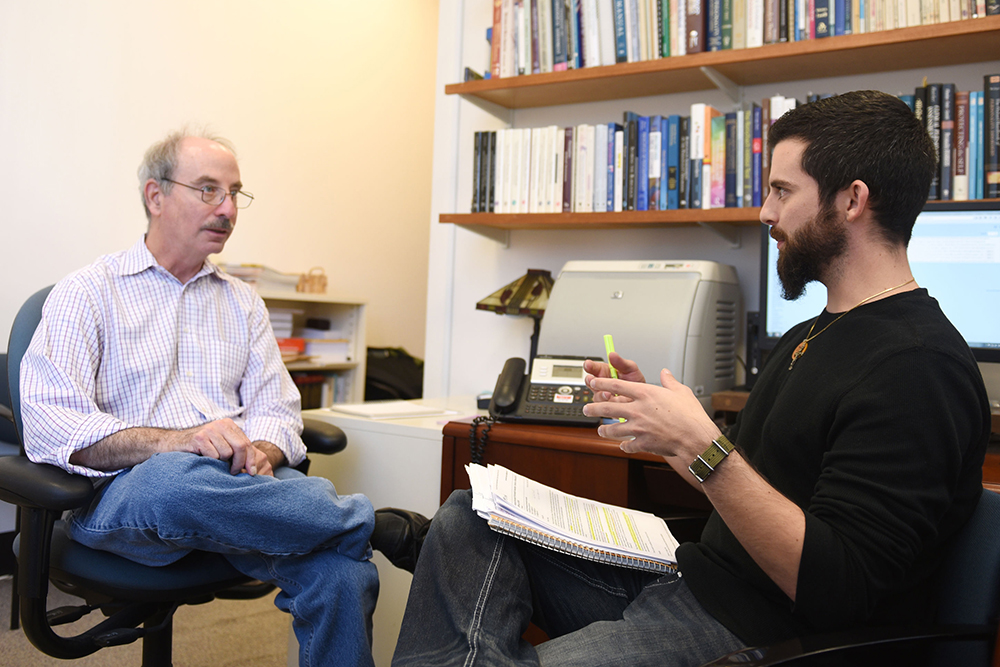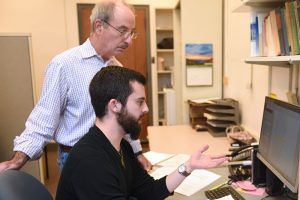Graduate school is all about small classes and close working relationships between students and faculty members. Adam P. Natoli, M.S., a Ph.D. candidate in his fourth year at Adelphi's Derner School of Psychology, is another student who is benefiting from collaborative work with a faculty mentor.
 Graduate school is all about small classes and close working relationships between students and faculty members. At Adelphi’s Gordon F. Derner School of Psychology, these relationships produce significant research, including a fascinating study of the impact current politics is having on patients’ experiences in therapy, which was published in the March 2018 Journal of Clinical Psychology by Nili Solomonov, Ph.D. ’18, and the school’s dean, Jacques P. Barber, Ph.D. The study was also the subject this fall of the cover story of Adelphi’s Academic and Creative Research Magazine.
Graduate school is all about small classes and close working relationships between students and faculty members. At Adelphi’s Gordon F. Derner School of Psychology, these relationships produce significant research, including a fascinating study of the impact current politics is having on patients’ experiences in therapy, which was published in the March 2018 Journal of Clinical Psychology by Nili Solomonov, Ph.D. ’18, and the school’s dean, Jacques P. Barber, Ph.D. The study was also the subject this fall of the cover story of Adelphi’s Academic and Creative Research Magazine.
Adam P. Natoli, a Ph.D. candidate in his fourth year at Derner, is another student who is benefiting from collaborative work with a faculty mentor, Professor Robert F. Bornstein, Ph.D.
“I’ve been a research assistant for Dr. Robert F. Bornstein since I came to Adelphi in 2015,” Natoli said, “and it’s given me the chance to work with him on a number of studies related to personality and psychological assessment, including one funded by the National Institute of Mental Health. He was the president of the Society for Personality Assessment, and he supported me in obtaining a leadership role as president of the society’s graduate student association.”
Like his mentor, Natoli is particularly interested in the way that different types of psychological tests can produce different results. Questionnaires call for self-reflection, asking respondents to consider their feelings or behaviors in order to provide answers. Other tests are meant to elicit a more direct response that reflects the way the respondent sees the world. Since these tests use different methods, their results often don’t match closely, even when both are specifically designed to measure the same construct. For that reason, Dr. Bornstein and Natoli believe that integrating data from multiple tests can lead to a more precise and nuanced understanding of an individual.
Natoli has explored these testing issues in a number of his own research projects, sharing his findings in 10 professional presentations, four publications and three first-authored articles currently under review for publication.
 “Dr. Bornstein has been enormously helpful in attaining funding for this research,” he explained. “I’ve been able to obtain a research grant from the Society for Personality Assessment, as well as a much larger grant from the American Psychoanalytic Association to fund my dissertation. I’m also resubmitting a research proposal to the National Institutes of Health, hoping to get further funding; it’s very complex, and Dr. Bornstein has really helped me navigate the process.”
“Dr. Bornstein has been enormously helpful in attaining funding for this research,” he explained. “I’ve been able to obtain a research grant from the Society for Personality Assessment, as well as a much larger grant from the American Psychoanalytic Association to fund my dissertation. I’m also resubmitting a research proposal to the National Institutes of Health, hoping to get further funding; it’s very complex, and Dr. Bornstein has really helped me navigate the process.”
Natoli also benefits from working with other highly motivated students. “I have weekly lab meetings with two or three other doctoral students to talk about our research and our training,” he explained. “One of us will come up with a broad area for research, and we’ll talk about it, narrow it down and discuss ways the idea might be tested. It’s a vital first step in designing a study.”
The give-and-take in labs often leads to collaborative projects between students. Natoli and a second-year doctoral student who has already shown a talent for research, Adelya Urmanche, are currently working together to establish a new approach for measuring personality functioning (which is the way a person perceives himself or herself and relates to others). They plan to use this approach to study how people with different levels of impairment in personality functioning relate to their therapist in treatment.
Natoli hopes to go into academia once he’s received his doctorate, landing at a university where he can continue his research. When he reaches this goal, he’s certain to look back at his education at Adelphi as a model of collaboration and mentorship, where students work with faculty and with one another to conduct research and advance scholarship. As Dr. Bornstein noted, “One of the unique things about Adelphi is that it affords students the opportunity to do innovative, transformative research—not only by collaborating with faculty, but with each other as well.”
For further information, please contact:
Todd Wilson
Strategic Communications Director
p – 516.237.8634
e – twilson@adelphi.edu